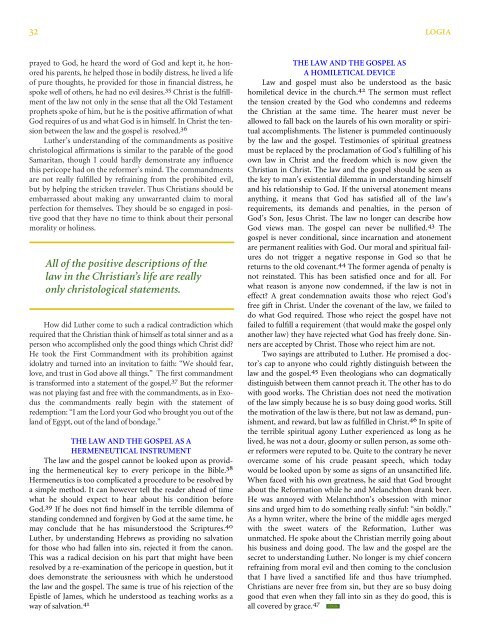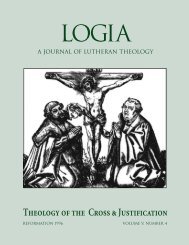03-1 Pastoral Care.pdf
03-1 Pastoral Care.pdf
03-1 Pastoral Care.pdf
- No tags were found...
You also want an ePaper? Increase the reach of your titles
YUMPU automatically turns print PDFs into web optimized ePapers that Google loves.
32 LOGIAprayed to God, he heard the word of God and kept it, he honoredhis parents, he helped those in bodily distress, he lived a lifeof pure thoughts, he provided for those in financial distress, hespoke well of others, he had no evil desires. 35 Christ is the fulfillmentof the law not only in the sense that all the Old Testamentprophets spoke of him, but he is the positive affirmation of whatGod requires of us and what God is in himself. In Christ the tensionbetween the law and the gospel is resolved. 36Luther’s understanding of the commandments as positivechristological affirmations is similar to the parable of the goodSamaritan, though I could hardly demonstrate any influencethis pericope had on the reformer’s mind. The commandmentsare not really fulfilled by refraining from the prohibited evil,but by helping the stricken traveler. Thus Christians should beembarrassed about making any unwarranted claim to moralperfection for themselves. They should be so engaged in positivegood that they have no time to think about their personalmorality or holiness.All of the positive descriptions of thelaw in the Christian’s life are reallyonly christological statements.How did Luther come to such a radical contradiction whichrequired that the Christian think of himself as total sinner and as aperson who accomplished only the good things which Christ did?He took the First Commandment with its prohibition againstidolatry and turned into an invitation to faith: “We should fear,love, and trust in God above all things.” The first commandmentis transformed into a statement of the gospel. 37 But the reformerwas not playing fast and free with the commandments, as in Exodusthe commandments really begin with the statement ofredemption: “I am the Lord your God who brought you out of theland of Egypt, out of the land of bondage.”THE LAW AND THE GOSPEL AS AHERMENEUTICAL INSTRUMENTThe law and the gospel cannot be looked upon as providingthe hermeneutical key to every pericope in the Bible. 38Hermeneutics is too complicated a procedure to be resolved bya simple method. It can however tell the reader ahead of timewhat he should expect to hear about his condition beforeGod. 39 If he does not find himself in the terrible dilemma ofstanding condemned and forgiven by God at the same time, hemay conclude that he has misunderstood the Scriptures. 40Luther, by understanding Hebrews as providing no salvationfor those who had fallen into sin, rejected it from the canon.This was a radical decision on his part that might have beenresolved by a re-examination of the pericope in question, but itdoes demonstrate the seriousness with which he understoodthe law and the gospel. The same is true of his rejection of theEpistle of James, which he understood as teaching works as away of salvation. 41THE LAW AND THE GOSPEL ASA HOMILETICAL DEVICELaw and gospel must also be understood as the basichomiletical device in the church. 42 The sermon must reflectthe tension created by the God who condemns and redeemsthe Christian at the same time. The hearer must never beallowed to fall back on the laurels of his own morality or spiritualaccomplishments. The listener is pummeled continuouslyby the law and the gospel. Testimonies of spiritual greatnessmust be replaced by the proclamation of God’s fulfilling of hisown law in Christ and the freedom which is now given theChristian in Christ. The law and the gospel should be seen asthe key to man’s existential dilemma in understanding himselfand his relationship to God. If the universal atonement meansanything, it means that God has satisfied all of the law’srequirements, its demands and penalties, in the person ofGod’s Son, Jesus Christ. The law no longer can describe howGod views man. The gospel can never be nullified. 43 Thegospel is never conditional, since incarnation and atonementare permanent realities with God. Our moral and spiritual failuresdo not trigger a negative response in God so that hereturns to the old covenant. 44 The former agenda of penalty isnot reinstated. This has been satisfied once and for all. Forwhat reason is anyone now condemned, if the law is not ineffect? A great condemnation awaits those who reject God’sfree gift in Christ. Under the covenant of the law, we failed todo what God required. Those who reject the gospel have notfailed to fulfill a requirement (that would make the gospel onlyanother law) they have rejected what God has freely done. Sinnersare accepted by Christ. Those who reject him are not.Two sayings are attributed to Luther. He promised a doctor’scap to anyone who could rightly distinguish between thelaw and the gospel. 45 Even theologians who can dogmaticallydistinguish between them cannot preach it. The other has to dowith good works. The Christian does not need the motivationof the law simply because he is so busy doing good works. Stillthe motivation of the law is there, but not law as demand, punishment,and reward, but law as fulfilled in Christ. 46 In spite ofthe terrible spiritual agony Luther experienced as long as helived, he was not a dour, gloomy or sullen person, as some otherreformers were reputed to be. Quite to the contrary he neverovercame some of his crude peasant speech, which todaywould be looked upon by some as signs of an unsanctified life.When faced with his own greatness, he said that God broughtabout the Reformation while he and Melanchthon drank beer.He was annoyed with Melanchthon’s obsession with minorsins and urged him to do something really sinful: “sin boldly.”As a hymn writer, where the brine of the middle ages mergedwith the sweet waters of the Reformation, Luther wasunmatched. He spoke about the Christian merrily going abouthis business and doing good. The law and the gospel are thesecret to understanding Luther. No longer is my chief concernrefraining from moral evil and then coming to the conclusionthat I have lived a sanctified life and thus have triumphed.Christians are never free from sin, but they are so busy doinggood that even when they fall into sin as they do good, this isall covered by grace. 47 LOGIA
















